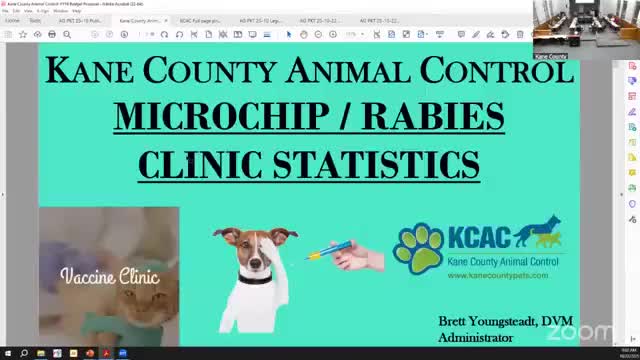Kane County animal clinic reaches 60th event; officials highlight low‑cost rabies shots and free microchip registration
Get AI-powered insights, summaries, and transcripts
Subscribe
Summary
Kane County animal‑control staff reported completing their 60th clinic and season 11 of drive‑through rabies and microchip clinics, stressing low costs, automatic microchip registration with 24 Hour PetWatch and plans to schedule 2026 dates. Staff also described a recent microchip company closure that has complicated some owner lookups.
Kane County animal‑control staff said the county completed its 60th clinic this season and will begin scheduling dates for 2026 in January.
Brett Youngstead, animal‑control staff, told the Public Health Committee on Oct. 22 that the program’s drive‑through format “has been fantastic” for moving animals through the line safely and efficiently and for serving people who cannot afford standard veterinary prices. “When you get a vaccine, you must get a rabies tag at our clinics. You’re automatically registered,” Youngstead said. He added that the $15 rabies fee includes implantation and registration for microchips and that the county uses 24 Hour PetWatch for registration.
Youngstead provided figures for the 2025 season and long‑term trends. The county administered about 698 vaccines at the most recent clinic and contrasted that with roughly 24,000 vaccines given across private veterinarians in the county; he characterized the county clinics as aimed at people who cannot afford routine veterinary care. The clinic has operated in a reduced schedule since the COVID pandemic but reached a “sweet spot” of six clinics in normal seasons, he said.
Youngstead said the clinic is intended to be self‑sustaining rather than profit‑making. For the most recent year he reported roughly $20,565 in clinic receipts against about $18,000 in direct clinic costs (overtime, fees and extra utilities), leaving a small net that helps offset facility costs. Over 11 years, Youngstead said the program has collected about $100,000 in gross receipts while emphasizing the program’s public‑service purpose.
He noted a legal and fee change made to comply with Illinois state law: the county adjusted tag fees so neutered animals receive a free tag while non‑neutered animals pay a minimum $10 differential. “Two years ago we learned we were not compliant with state law. So we got that corrected through an ordinance,” Youngstead said, adding that senior human owners (age 65 and older) still qualify for free tags for neutered animals.
Youngstead also warned the committee about a recent microchip‑company closure that erased registration data for some owners. “There is a group out there with microchips that are not usable,” he said, adding that those were not chips the county uses. He contrasted that with the county’s practice of registering every chip it implants with a single registry at the time of implantation.
Committee members asked about clinic logistics, outreach and whether non‑neutered animals were less likely to be vaccinated. Youngstead said most clinic animals are neutered and that non‑neutered counts have been relatively steady. He described outreach through senior services, libraries and social media and said the county is open to partnering with schools or day‑care programs to reach parents.
Youngstead said the department is planning dates for 2026 with a new veterinarian and hopes to schedule the full year up front. “It pays for itself. It is not meant to be our big profit making,” he said.
Ending: The county presented the clinic as a low‑cost, access‑oriented public service that includes lifetime microchip registration at the point of implantation; staff will return with proposed 2026 dates and said they are exploring additional outreach channels.
